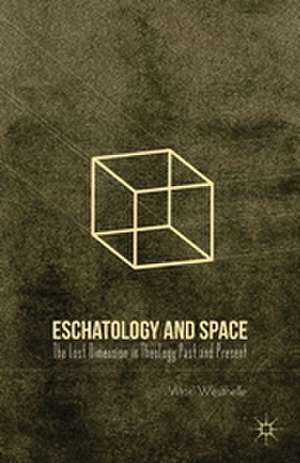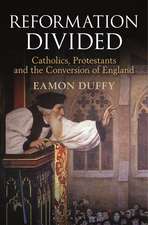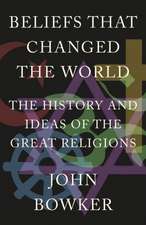Eschatology and Space: The Lost Dimension in Theology Past and Present
Autor V. Westhelleen Limba Engleză Hardback – 14 sep 2012
| Toate formatele și edițiile | Preț | Express |
|---|---|---|
| Paperback (1) | 727.97 lei 6-8 săpt. | |
| Palgrave Macmillan US – 14 sep 2012 | 727.97 lei 6-8 săpt. | |
| Hardback (1) | 725.75 lei 6-8 săpt. | |
| Palgrave Macmillan US – 14 sep 2012 | 725.75 lei 6-8 săpt. |
Preț: 725.75 lei
Preț vechi: 885.06 lei
-18% Nou
Puncte Express: 1089
Preț estimativ în valută:
138.89€ • 144.47$ • 114.66£
138.89€ • 144.47$ • 114.66£
Carte tipărită la comandă
Livrare economică 14-28 aprilie
Preluare comenzi: 021 569.72.76
Specificații
ISBN-13: 9780230110342
ISBN-10: 0230110347
Pagini: 208
Ilustrații: XV, 191 p.
Dimensiuni: 140 x 216 x 18 mm
Greutate: 0.39 kg
Ediția:2012
Editura: Palgrave Macmillan US
Colecția Palgrave Macmillan
Locul publicării:New York, United States
ISBN-10: 0230110347
Pagini: 208
Ilustrații: XV, 191 p.
Dimensiuni: 140 x 216 x 18 mm
Greutate: 0.39 kg
Ediția:2012
Editura: Palgrave Macmillan US
Colecția Palgrave Macmillan
Locul publicării:New York, United States
Cuprins
Introduction Region and Religion Space, History, and the Kingdom Eschatological Crisis and Renewal Types of Eschatological Thinking The Postcolonial Challenge Dimensions of Liminality Toward a Latitudinal Eschatology Condemnation and Salvation: a Conclusion
Recenzii
"This evocative and beautiful book constitutes a paradigm shift from the time and history to the space of theological geopolitics. Space is a dimension that has gone unnoticed under the hegemony of the Heilsgeschichte in theology, and Westhelle reveals why it is necessary to discover the importance of the tangential space of the border, the margin, the desert, the stranger, the eschaton (because the latter is also space: "The Promise Land"): the eutopia. Along the way he examines the themes of exteriority, foreignness, colonialism, and the space of the Other as periphery, with domination as the center. From the classic theology, theology of liberation, and the postcolonial up to G. Agamben, J. Taubes and W. Benjamin, the author covers several histories to give importance to choratic eschatology. We from the South and oppressed exteriority salute this pioneering work!" - Enrique Dussel, Emérito UAM-Iztapalapa /Mexico city
"Eschatology and Space is the best book on theology that I've read in the past ten years. Westelle is right: starting with experience and vulnerability as spaces for divine revelation, he builds towards a new vision of eschatology in which salvation and condemnation are not only topics to ponder but rather realities that are already alive." - Elsa Tamez, professor at Latin American Biblical University, researcher at Ecumenical Department of Investigation (DEI), Costa Rica
"This is Westhelle at his best! Westhelle overturns thenear-absolute priority given to time over space in Christian eschatological thinking, demonstrating that such opposition is not biblical, but rather the outcome of a particularly western view of history. He makes the biblically and theologically persuasive case for 'latitudinal' eschatological categories such as crossing and place that can speak to migrants, the landless and all who experience the eschata at the margins today." - Barbara Rossing, author of The Rapture Exposed: The Message of Hope in the Book of Revelation
"Until now Christian eschatology has been interpreted only in terms of its temporal dimension. Vitor Westhelle has undertaken a remarkably creative rethinking of this in terms of its spatial dimension through the effective deployment of post-colonial and post-structuralist perspectives. The book will be indispensable for all who are interested in understanding eschatology and exploring new possibilities of eschatological meaning." - Ted Jennings, professor of Biblical and Constructive Theology, Chicago Theological Seminary
"Eschatology and Space is the best book on theology that I've read in the past ten years. Westelle is right: starting with experience and vulnerability as spaces for divine revelation, he builds towards a new vision of eschatology in which salvation and condemnation are not only topics to ponder but rather realities that are already alive." - Elsa Tamez, professor at Latin American Biblical University, researcher at Ecumenical Department of Investigation (DEI), Costa Rica
"This is Westhelle at his best! Westhelle overturns thenear-absolute priority given to time over space in Christian eschatological thinking, demonstrating that such opposition is not biblical, but rather the outcome of a particularly western view of history. He makes the biblically and theologically persuasive case for 'latitudinal' eschatological categories such as crossing and place that can speak to migrants, the landless and all who experience the eschata at the margins today." - Barbara Rossing, author of The Rapture Exposed: The Message of Hope in the Book of Revelation
"Until now Christian eschatology has been interpreted only in terms of its temporal dimension. Vitor Westhelle has undertaken a remarkably creative rethinking of this in terms of its spatial dimension through the effective deployment of post-colonial and post-structuralist perspectives. The book will be indispensable for all who are interested in understanding eschatology and exploring new possibilities of eschatological meaning." - Ted Jennings, professor of Biblical and Constructive Theology, Chicago Theological Seminary
Notă biografică
VITOR WESTHELLE Professor of Systematic Theology at Lutheran School of Theology at Chicago, USA.









